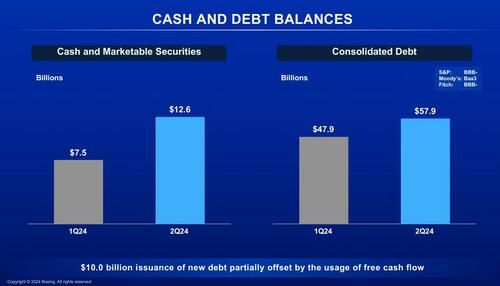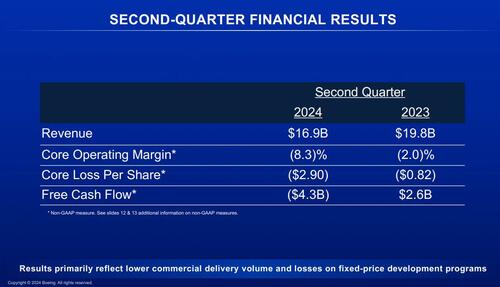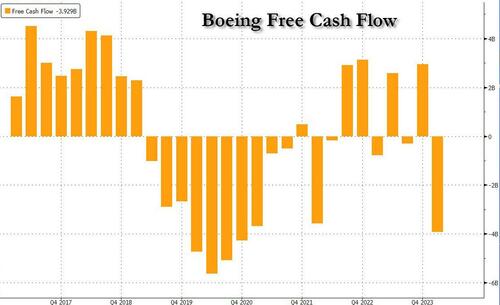Boeing is finally going back to its core engineering roots.
The aerospace giant has named former Rockwell Collins boss Kelly Ortberg as its new CEO, handing the former head of one of its suppliers the task of steering the embattled plane maker through what is its biggest crisis in the company's history.
The appointment of Ortberg, 64, who will start on August 8 and join Boeing’s board, ends months of speculation after Dave Calhoun said in March that he would step down by the end of the year (but not before cashing in on a huge golden parachute).
Boeing has been reeling, its stock tumbling to multi-year lows, since January when a door panel blew off a 737 Max during a commercial flight. Though no one was killed, some passengers were injured, and the accident recalled twin fatal crashes in 2018 and 2019 that the company has struggled to put behind it.
Ortberg is an experienced leader “with a well-earned reputation for building strong teams and running complex engineering and manufacturing companies”, said Boeing’s chair Steven Mollenkopf, who led the search for Calhoun’s replacement. “Kelly has the right skills and experience to lead Boeing in its next chapter.”
The 64-year-old led Rockwell Collins, which makes avionics and cabin equipment, for five years and helped oversee its $30bn tie-up in 2017 with United Technologies. Now known as Collins Aerospace, it is part of defense contractor RTX.
“I’m extremely honored and humbled to join this iconic company,” said Ortberg. “There is much work to be done, and I’m looking forward to getting started.”
His appointment comes as Boeing reported a $1.4BN second-quarter loss, far larger than Wall Street expected. The quarter was marked by $1BN in losses tied to fixed-price defense contracts and fewer plane deliveries. The company also reported a $2.90/share loss, far bigger than the $1.97 loss expected, on revenue which tumbled from $19.8 billion to just $16.9 billion, also missing estimates of $17.2 billion.
And the cherry on top of another gruesome quarter is that Boeing burned through a near-record $4.3 billion in cash, matching the worst quarters in the immediate aftermath of its 737 MAX crisis...
.... and sending the company's total debt soaring higher by $10 billion (and net debt rising by $5 billion).

Still, despite the dismal earnings, Boeing shares rose 2% as Ortberg’s recruitment ended months of speculation over who would take on the multiple challenges facing the company, and has given investors some hope that the epic shitshow that is Boeing's DEI-infused operations in the past five years will finally normalize.
Ortberg began his career in 1983 as an engineer at Texas Instruments, before joining Rockwell Collins as a programme manager. As reported previously, many in the aerospace industry had strongly favored an engineer taking the top job at Boeing, with critics suggesting it had prioritized shareholder returns (and DEI virtue signaling) over investment in engineering and innovation.
The new CEO will be under immediate pressure to restore confidence in the quality and safety of Boeing’s manufacturing operations, as well as finding ways to ease the supply chain strains that have hobbled the industry since the pandemic.
Boeing’s airline customers have been angered by delays in plane deliveries during a period in which rival Airbus has won market share.
Rob Stallard, analyst at Vertical Research Partners, said Ortberg was a “very good hire”.
“While he may not be as well known as say Larry Culp (GE) or Dave Gitlin (Carrier), in our experience Kelly was an excellent CEO of Rockwell Collins,” Stallard said. “What he brings to the party is not only a wealth of A&D experience, but also a record of running a company with an excellent corporate culture. Clearly there are a massive number of problems at Boeing, but with Kelly as CEO we think there is at least a chance of fixing them.”
Not that the new CEO is blemish-free: Ortberg will join after Boeing pleaded guilty on July 24 to a felony fraud charge for misleading the US Federal Aviation Administration. Boeing recorded a charge of $244mn in the second quarter tied to the penalty the company expects to pay.
Boeing is finally going back to its core engineering roots.
The aerospace giant has named former Rockwell Collins boss Kelly Ortberg as its new CEO, handing the former head of one of its suppliers the task of steering the embattled plane maker through what is its biggest crisis in the company's history.
The appointment of Ortberg, 64, who will start on August 8 and join Boeing’s board, ends months of speculation after Dave Calhoun said in March that he would step down by the end of the year (but not before cashing in on a huge golden parachute).
Boeing has been reeling, its stock tumbling to multi-year lows, since January when a door panel blew off a 737 Max during a commercial flight. Though no one was killed, some passengers were injured, and the accident recalled twin fatal crashes in 2018 and 2019 that the company has struggled to put behind it.
Ortberg is an experienced leader “with a well-earned reputation for building strong teams and running complex engineering and manufacturing companies”, said Boeing’s chair Steven Mollenkopf, who led the search for Calhoun’s replacement. “Kelly has the right skills and experience to lead Boeing in its next chapter.”
The 64-year-old led Rockwell Collins, which makes avionics and cabin equipment, for five years and helped oversee its $30bn tie-up in 2017 with United Technologies. Now known as Collins Aerospace, it is part of defense contractor RTX.
“I’m extremely honored and humbled to join this iconic company,” said Ortberg. “There is much work to be done, and I’m looking forward to getting started.”
His appointment comes as Boeing reported a $1.4BN second-quarter loss, far larger than Wall Street expected. The quarter was marked by $1BN in losses tied to fixed-price defense contracts and fewer plane deliveries. The company also reported a $2.90/share loss, far bigger than the $1.97 loss expected, on revenue which tumbled from $19.8 billion to just $16.9 billion, also missing estimates of $17.2 billion.
And the cherry on top of another gruesome quarter is that Boeing burned through a near-record $4.3 billion in cash, matching the worst quarters in the immediate aftermath of its 737 MAX crisis...
.... and sending the company's total debt soaring higher by $10 billion (and net debt rising by $5 billion).

Still, despite the dismal earnings, Boeing shares rose 2% as Ortberg’s recruitment ended months of speculation over who would take on the multiple challenges facing the company, and has given investors some hope that the epic shitshow that is Boeing's DEI-infused operations in the past five years will finally normalize.
Ortberg began his career in 1983 as an engineer at Texas Instruments, before joining Rockwell Collins as a programme manager. As reported previously, many in the aerospace industry had strongly favored an engineer taking the top job at Boeing, with critics suggesting it had prioritized shareholder returns (and DEI virtue signaling) over investment in engineering and innovation.
The new CEO will be under immediate pressure to restore confidence in the quality and safety of Boeing’s manufacturing operations, as well as finding ways to ease the supply chain strains that have hobbled the industry since the pandemic.
Boeing’s airline customers have been angered by delays in plane deliveries during a period in which rival Airbus has won market share.
Rob Stallard, analyst at Vertical Research Partners, said Ortberg was a “very good hire”.
“While he may not be as well known as say Larry Culp (GE) or Dave Gitlin (Carrier), in our experience Kelly was an excellent CEO of Rockwell Collins,” Stallard said. “What he brings to the party is not only a wealth of A&D experience, but also a record of running a company with an excellent corporate culture. Clearly there are a massive number of problems at Boeing, but with Kelly as CEO we think there is at least a chance of fixing them.”
Not that the new CEO is blemish-free: Ortberg will join after Boeing pleaded guilty on July 24 to a felony fraud charge for misleading the US Federal Aviation Administration. Boeing recorded a charge of $244mn in the second quarter tied to the penalty the company expects to pay.


